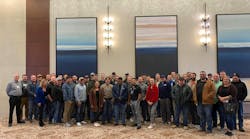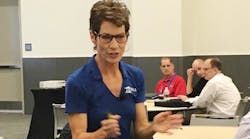CLEVELAND – Ellen Rohr welcomed attendees to Contractor Leadership Live 2017 by talking a bit about her life’s journey. From meeting and marrying Bob “Hot Rod” Rohr to becoming a business coach to heading up Ben Franklin Plumbing and, most recently, as president of Zoom Drain and Sewer, Rohr’s approach to business success has been guided by just a few key principles.
First and foremost: Charge more than it costs. And before you can do that, you need to know how much it costs. Not what the guy down the street thinks it costs, not what your customers think it costs, but what is going to be a fair price for you, the tradesperson doing the work.
And if you’re not charging enough, you’re going to have to change.
“Sometimes change is scary,” Rohr said. “Sometimes, people only change when the pain of standing still becomes greater than the fear of change.”
The key, she said, is to ask yourself the big question: What do you want? Is it money? Well, fine, but money to do what? Do you want to retire someplace warm? Do you want to provide for your family? Maybe build something to pass on to your kids? To give something back to your community?
Once you have that answer, then you ask your employees what it is they want. Is it money? Well, again, fine. But money and what else? Is it respect? Is it a place to belong? Is it a chance to advance their careers?
“The business,” Rohr said, “is just a vehicle to drive you and your team in the direction of your dreams.”
Avoid the drama
“If you just allow the people on your team to help you,” Rohr said, “they will solve all your problems for you.”
The key is putting together a top-notch team. What stands in the way of that? Well, there are the kooky family members who might or might not show up to work depending on the day of the week. There are the “fence-testers” who are always pushing the limits just to see where the real limits might be. Then there are the people who think they can’t be fired because the cost of replacing them is too high.
All the workplace drama that sucks the morale and productivity out of a business can be traced back to those people who think the rules don’t apply to them. Rohr advises, “Treat family members as employees, and treat employees like family.” Rely on standards and best-practices and make them the same for everybody.
A simple start is with an organizational chart. Everybody get to see, mapped out, where they are in the company. Looking at it gives clear answers to the questions every employee has: Where do I stand? Who is my boss? What is my next step in the organization?
Then each box in the org chart gets a description with their duties and responsibilities clearly mapped out. From there, each position is half way to having its own manual. That, Rohr explains, is really the essence of franchising.
And for those who think writing up those manuals sounds like a lot of work, it is. But there is help to be had. Some people hire business coaches. Some opt to actually join a franchise. But for those who want to do it themselves, Rohr recommends recruiting the actual employees who perform the work, and giving them the time, the resources, and if needed the training to do it.
The tough conversations
Once the rules are all mapped out employees need to be held accountable for their behaviors. “Don’t speak to the attitude,” Rohr said, “talk about behavior – you can’t read their minds anyway!”
Discipline should be progressive, moving from verbal warning to written warning to a suspension (30 to 60 days), to finally The Door -- parting ways with the company. And Rohr even believes in a step beyond that: clemency. Finding some sort of reconciliation that allows a one-time worker to return to the company.
Each step involves one of those tough conversations. The tough conversation is:
· Private
· Is done as soon as possible following the infraction
· Realizes that sometimes the infraction is a new one not covered by the manual
· Sticks to the facts
· Tells them how close they are to The Door
“Do they want to go out the door? Is there an action plan to keep them from going out the door?”
One of the key distinctions to keep in mind, Rohr said, is between “willing” and “capable.” A person with a functioning arm is capable of turning a wrench, but they might be unwilling to do it.
“One of the first things we do in any interview,” Rohr said, “ is have the applicant sing ‘Happy Birthday.’ We know they’re capable of it – everyone knows the song – but if they’re willing to do it, just because we ask, that says a lot.”
And on the other side, there are some people who for some positions who are simply not capable.
“I think it’s unethical to keep a person on your team who isn’t winning,” Rohr said. “Get good or get gone… if you’re not winning, I’m not going to force you to lose every day.”
But she is steadfast in the belief that that combination of disciple and, yes, love, can achieve fantastic things for a company and the people who run it.
“It’s okay if it’s hard,” she said, “If it’s hard it means something.”









